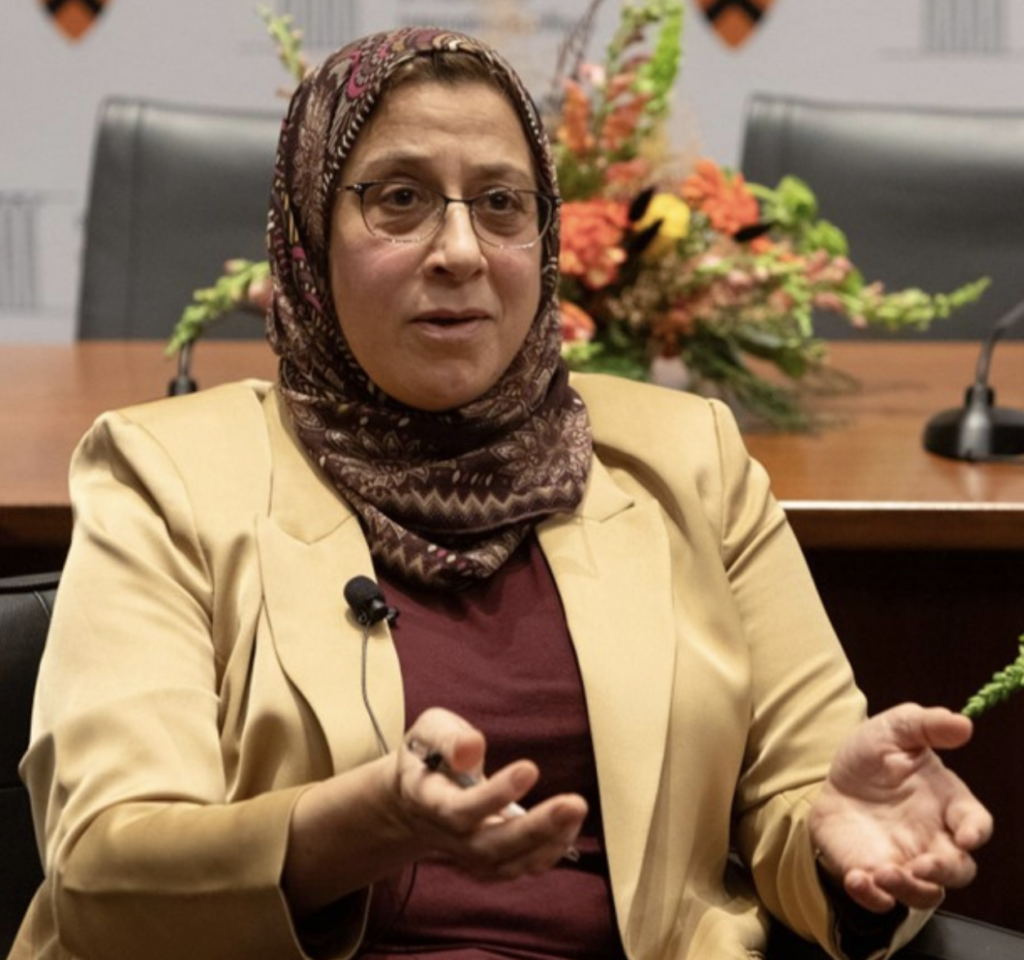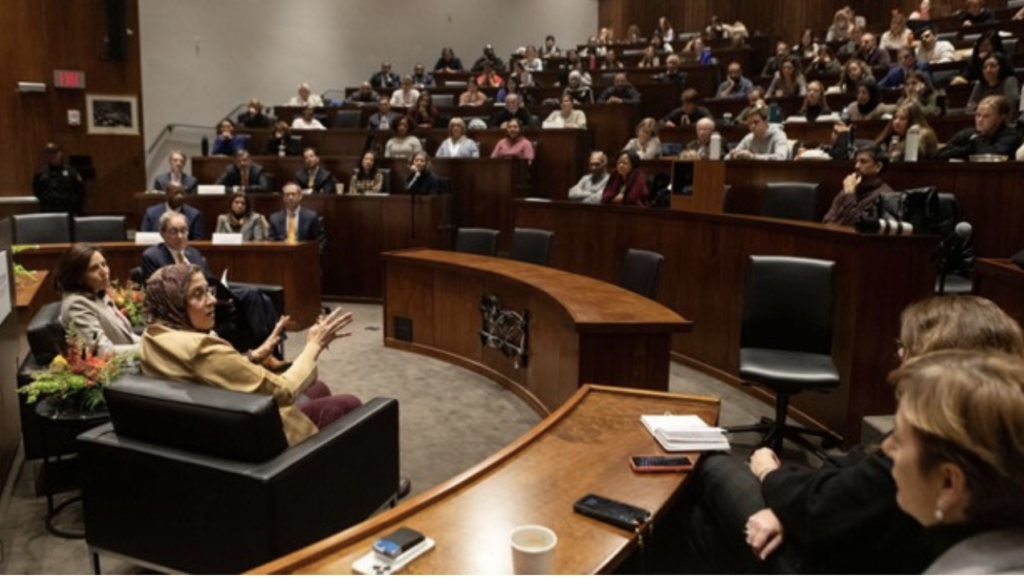Pathbreakers of Arab America—Amaney A. Jamal

By: John Mason / Arab America Contributing Writer
This is the twenty-eighth in Arab America’s series on American pathbreakers of Arab descent. The series includes personalities from entertainment, business, sports, science, academia, journalism, and politics, among other areas. Our twenty-eighth pathbreaker is Amaney Jamal, born to a Palestinian family displaced by war. Dr. Jamal is the dean of the Princeton School of Public and International Affairs, Edwards S. Sanford Professor of Politics, and Professor of Politics and International Affairs at Princeton University. Jamal is the former Director of the Mamdouha S. Bobst Center for Peace and Justice. She also directs the Workshop on Arab Political Development and the Bobst-American University of Beirut Collaborative Initiative.
Preeminent Arab American scholar, Amaney Jamal, an expert on comparative politics of the Middle East
Amaney A. Jamal was born December 30, 1970, to Palestinian parents forced from Palestine by war. (Information on her early background is sparse, so we rely on more contemporary reports for this account.) Jamal’s academic background is legendary, having received her bachelor’s degree in politics at UCLA in 1993, followed by her Ph.D. in political science from the University of Michigan. Wikipedia states that she specializes in “democratization and civic engagement in the Arab world as well as Muslim and Arab civic engagement in the US.”
Besides her deanship at Princeton, Jamal directs the Workshop on Arab Political Development at Princeton University and is the principal investigator of the “Arab Barometer” Project. She is also a senior advisor on the PEW Research Center Projects focusing on Islam in America and Global Islam. Jamal is a frequent participant in TV and journalism programs, including, respectively, MSNBC, Al Jazeera, and the Washington Post, for which she provided expertise on issues such as the Palestinian–Israeli conflict, politics of the larger Arab world, and, more recently, the Hamas-Israel war.
Jamal’s writings are equally legendary. Notably, her book, Barriers to Democracy (2007), according to Princeton Politics, “explores the role of civic associations in promoting democratic effects in the Arab world.” It won the 2008 American Political Science Best Book Award in the Comparative Democratization section. Her other books of note include:
• Of Empires and Citizens: Pro-American Democracy or No Democracy at All (Fall 2012, Princeton University Press)
• Race and Arab Americans after 9-11: From Invisible Citizens to Visible Subjects (edited with Nadine Naber), Syracuse University Press, 2008, and
• Citizenship and Crisis: Arab Detroit after 9-11. (Co-authors Wayne Baker, Sally Howell, Ann Lin, Andrew Shryock, Ron Stockton, and Mark Tessler) Russell Sage, 2009.
Key New York Times Op-Ed on the Hamas-Israel War by Amaney Jamal and Keren Yarhi-Milo: “The Discourse Is Toxic. Universities Can Help.”
A Times Op-Ed by Palestinian American Jamal and Israeli American, Yari-Milo, on October 23, 2023, has shed a bright light on how the Hamas-Israel war has reverberated on American campuses and across American society. Yari-Milo is the dean of Columbia University’s School of International and Public Affairs. She and Jamal befriended over ten years as colleagues at Princeton before Yari-Milos accepted her Columbia position. Noted already, Jamal is the daughter of a Palestinian family displaced by war, while Yari-Milo served in Israeli military intelligence before becoming an academic.

In the Op-Ed, Jamal and Yari-Milo noted, “Notwithstanding our different backgrounds, we are both alarmed by the climate on campuses and the polarizing and dehumanizing language visible throughout society.” They provide guidelines to universities for developing leadership qualities in their students “to think creatively and boldly. It starts with countering harmful speech; modeling civic dialogue, mutual respect, and empathy; and showing an ability to listen to one another.” Universities need to step away from their ivory towers to reduce the level of hate speech and teach students to listen and engage with the other side.
The authors are especially concerned with chants such as “From the river to the sea, Palestine will be free.” This phrase commonly equates to calls for “the annihilation of the state of Israel” but most Palestinians simply want their own state on the West Bank alongside the Israeli state, following the 1993 Oslo Accords. Also, they aver that facts are facts and Hamas must be called out on the “Oct. 7 massacre of Israeli civilians” and denouncing it as “an act of terrorism,” even at the risk of offending some Palestinians.
The hard questions are those concerning the future of Gaza, starting up the peace process, and “how the security and safety of Israelis and Palestinians will be achieved.” Furthermore, the authors insist, that Israel must be called out for its bombing of civilian areas, even if that may offend some Israelis and their supporters. Only a dialogue on campuses can address the present environment based on “hate speech, antisemitism, Islamophobia, and other stereotypical tropes.”
As a follow-up to the Times Op-Ed, the two deans held a conversation with students and faculty at Princeton. The dialogue was intended to “model scholarly discourse” during discussions about the Israel-Hamas war. A second conversation was planned for Columbia’s campus. Jamal and Yarhi-Milo set forth a model for establishing the principles stated in the Op-Ed. Key to the discussion was the openness of the deans in recognizing their “respective identities as Palestinian and Israeli and that it’s a model of constructive and courageous conversations about a very difficult topic.” Both deans underlined the fact that a peaceful resolution of the Middle East conflict “requires tremendous work.”
Jamal clarified the context for peacemaking: “I want to make sure that every student hears this. Peace is not simply hiding out there and if you call it, it is going to come and present itself. Peace requires work. Peace requires leadership, and all of you who are going to be future policymakers need to think about it concretely.” Yarhi-Milo followed, “It will be the passionate and thoughtful students like the ones in the audience who can help pave a path forward as future leaders.”
Sources:
–“Amaney Jamal,” Wikipedia, 2023
–“Amaney A. Jamal,” Princeton Politics, Princeton University, 2023
–“The Discourse Is Toxic. Universities Can Help.,” Amaney Jamal and Keren Yarhi-Milo, Op Ed, New York Times, 10/30/2023.
–“Princeton and Columbia policy school deans model scholarly discourse during talk about Israel-Hamas war,” Princeton University News, 11/29/2023
John Mason, Ph.D., focuses on Arab culture, society, and history, and is the author of LEFT-HANDED IN AN ISLAMIC WORLD: An Anthropologist’s Journey into the Middle East, New Academia Publishing, 2017. He has taught at the University of Libya, Benghazi, Rennselaer Polytechnic Institute in New York, and the American University in Cairo; John served with the United Nations in Tripoli, Libya, and consulted extensively on socioeconomic and political development for USAID and the World Bank in 65 countries.
The views and opinions expressed in this article are those of the author and do not necessarily reflect the position of Arab America.
Check out our Blog here!








